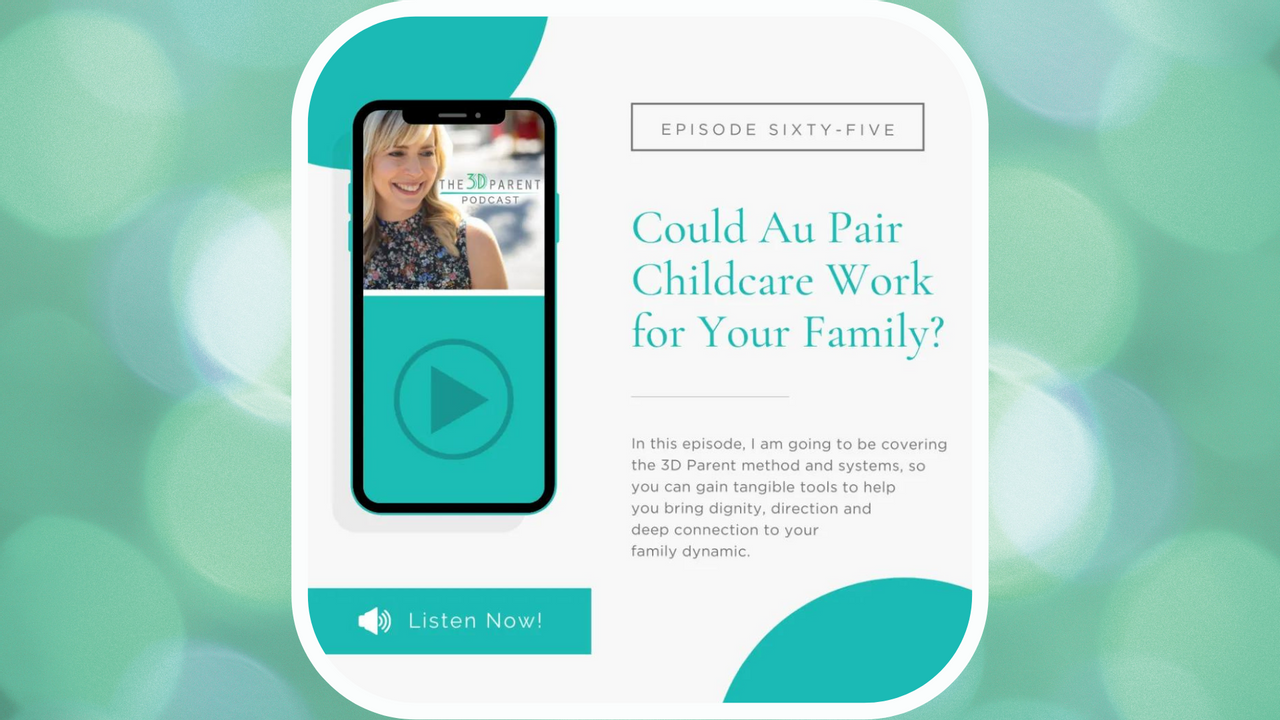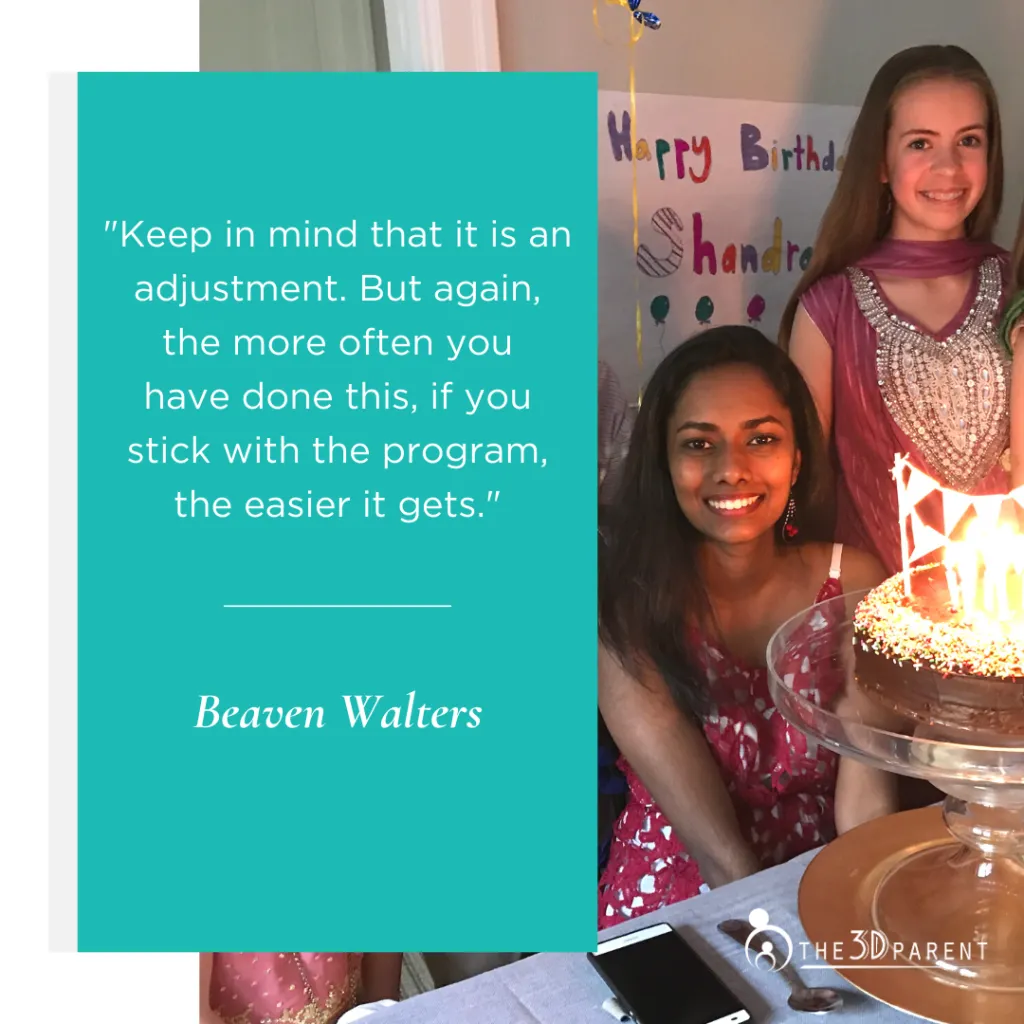[00:08] Having an au pair can not only be a good childcare option, but it can also be an enriching cultural experience for your family. I first want to explain what an au pair is and how an au pair is different than a nanny. Au pairs come to the U.S. through a cultural exchange program with a J-1 visa. They provide childcare in exchange for room, board, a stipend, and an opportunity to take classes. Au pairs are international men and women between the ages of 18-26, have some childcare experience, have at least a high school degree, and have some level of English proficiency. They go through a background check and have no criminal records. While some au pairs are infant certified, none are allowed to care for children under 3 mo. They sign up with a local au pair agency to help them find placements with families in the US.
[04:49] My family has a lot of experience with au pairs. We welcomed our first au pair about ten years ago. At the time, my husband was having to travel for work often. I was busy getting my parenting coach certification and doing part-time work. Our family was also expanding (we now have four children), and we all had complex schedules. We knew that we needed extra help with childcare. And we also had a desire to give our children meaningful cross-cultural experiences. We wanted to build meaningful relationships with diverse people from countries, cultures, races, who spoke different languages than our own. All in all, we hosted a total of eight au pairs, who came from all over the world. We had au pairs from Brazil, South Korea, Sweden, Columbia, and South Africa. It was wonderful not only to have a second pair of hands for help with children, but it was a wonderful cultural experience for our children as well.
[10:24] There are many pros to having an au pair. First, the cost is about half the cost of a traditional full-time nanny. To host an au pair, you will pay an agency fee that could range from $6,000 to-7000. This fee covers visas, travel, three days of training once they arrive in the U.S., health insurance, and the cost of a Local Childcare Coordinator (LCC). The LCC is a resource for both families and au pairs during the year. They will check in to make sure things are going well and help sort out any possible issues. There is also a $500 fee to provide classes for au pairs. They get to take college classes in various subjects, including English if they are working on their proficiency. Au pairs also earn a weekly $200 paid to them directly from the family.
[14:36] Other pros include an opportunity for them to build a connection with your family. They really become part of your family as they’re not a person clocking in and out. It’s important for your children to build strong connections with other adults besides their parents, and the au pair can be a nurturing presence in their lives. Another pro of having an au pair is that it allows for some flexibility. Au pairs can work up to 45 hours a week. They must get 1.5 days off a week, one full weekend off per month, and two weeks of paid vacation. But it’s up to the family and the au pair to work out this schedule. It depends on when you most need help with your children. And finally, as I previously mentioned, having an au pair can be a wonderful cultural exchange. My family has enjoyed learning new languages and eating food the au pairs would sometimes make that were staples of their culture.
[20:45] There are some things you should think about that could be the challenges of having an au pair. The first thing to consider is having enough space in your home. You’ll be taking on an extra person, and they need to have their own room. Another thing to consider is how patient and flexible you are. There is a learning curve that au pairs must go through. They must learn how your family operates, but they are also learning about a new culture, and often, a new language. So if you’re not by nature a flexible person, having an au pair might not be the best thing for you. You should also think about your ability to work through conflict. Do you avoid conflict? Or are you able to work through problems with patience? And do you have the mental bandwidth for building a relationship with another person? You would be responsible for a young adult if you host an au pair.
[26:06] It’s important to be clear and upfront about your family’s specific needs if you host an au pair. Think about if your au pair needs to drive your children, if you work from home, and if you may need more help around the house than an au pair can provide? They can do light housework related to your children, such as children’s laundry or preparing meals. But they are not your housekeeper. You should also consider the “hidden costs” of having an au pair. Remember you will have one more person in your house. So the cost of food, gas, vacations, and gifts will all go up. And depending on where you live, there may be negotiated extra pay for au pairs.
[32:27] One thing you might not have thought about is how appealing your family and location are to the au pair. You choose each other. Some au pairs might want to work with bigger families, and some may want to work with smaller families. Some may want to experience larger cities, and some may not. It can be frustrating if you’re not finding a match, but I encourage you to hang in there. The process takes time. It can help to think about what’s unique or appealing about your family and city and communicate that to potential au pairs. Also, know that the first time is the hardest in terms of the matching process. Subsequent au pairs can talk to potential au pairs about their experience with your family, and that can really help.
[38:00] I have several tips for how to find a good match with an au pair. First, know that you will be working with an agency. There are several au pair agencies out there including Au Pair Care, Culture Care, Au Pair International, and many more. As I said before, the matching process can be long and exhausting, so know that going in. And even after you find a match, it takes some time before they can come to your home, a minimum of eight weeks. Now with travel restrictions due to COVID-19, this process will take even longer. So just know that for your long-term plan. When communicating with potential au pairs, tell them about your city, what there is to do, proximity to other larger cities, public transportation, and climate. Remember that they are most likely not familiar with your city since they are from another country, even if it’s rather large.
[43:08] Communicate upfront with potential au pairs about the needs for your family-- your schedules, household expectations, time off, etc. Be sure to ask au pairs about why they wanted to become an au pair. Are they interested in careers working with children? Do they want to have an adventure, learn English, go to a new city, or meet new people? Ask what their plans are after they finish their time as an au pair. Another fun thing to do is make an offer in a creative way. You can involve your children in this and possibly make a sign or a video. Ultimately, take a leap of faith with it. We have had luck in our family, but it doesn’t always happen. But trust the process.
[49:14] Once you have matched, keep up regular communication with your au pair. When they arrive, it’s fun to involve your kids in greeting them and make welcome signs. You can greet them with gifts, and make their space cozy and comfortable. Plan bonding activities for the whole family to do for the first few days and weeks. Also know you may need to take time off at the beginning to help your au pair get used to things and learn the ropes of your family. Also, know that they will need to get some things accomplished in the first few weeks they are there like opening a bank account or maybe getting a driver’s test. Know that the first several weeks are a big learning curve and adjustment for everyone, but it will get easier over time.
[52:25] I can tell you that hosting au pairs was overall a wonderful experience for my family. We still keep in contact with some of them, which is really nice. I hope that this episode helped you decide if an au pair is right for you.











